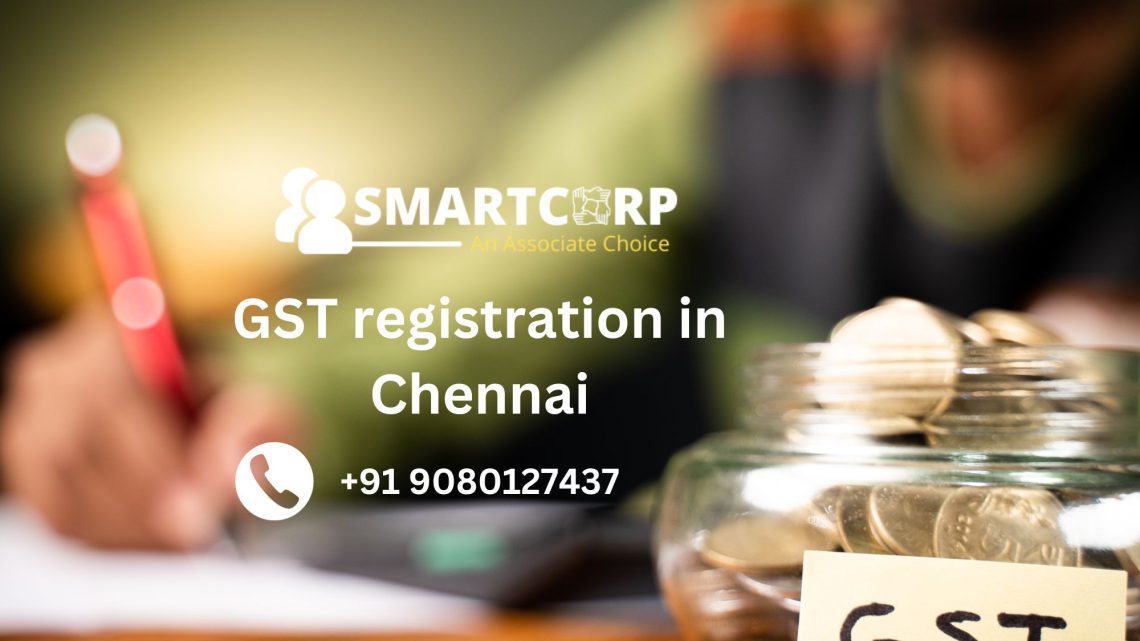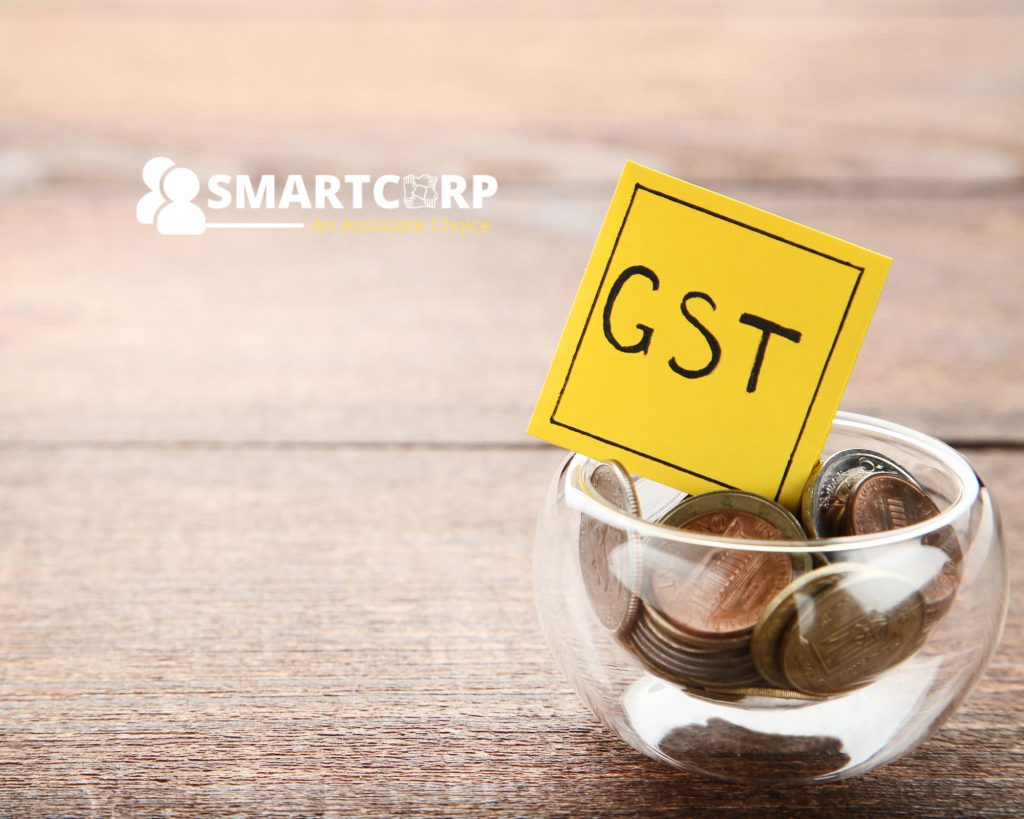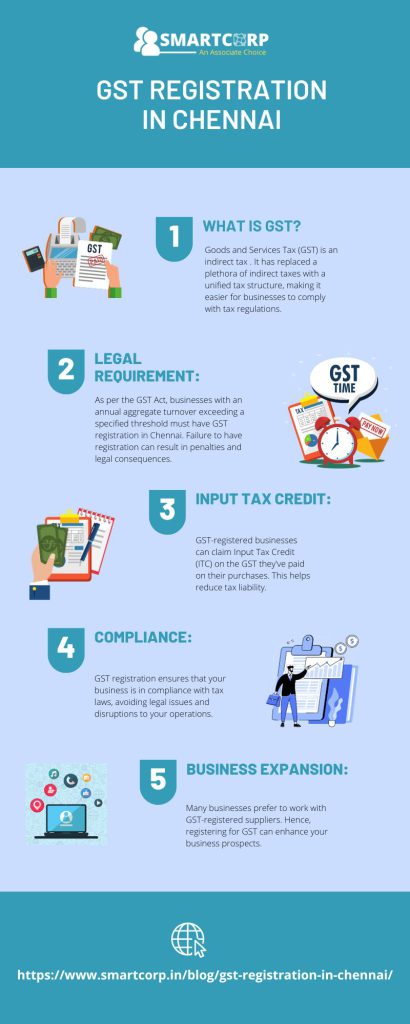
GST registration in Chennai
Goods and Services Tax (GST) is an indirect tax . It has replaced a plethora of indirect taxes with a unified tax structure, making it easier for businesses to comply with tax regulations. If you’re operating a business in Chennai, it’s essential to understand the GST registration process to ensure that you’re in compliance with the law. In this comprehensive guide, we’ll walk you through the GST registration process in Chennai, covering the key aspects and requirements.
What is GST?
GST, is a comprehensive tax levied on the supply of goods and services in India. It’s a destination-based tax, which means that the tax is collected at the point of consumption rather than the point of origin. GST subsumed various indirect taxes, such as Central Excise Duty, Service Tax, Value Added Tax (VAT), and more. This single tax structure has simplified the taxation system and promotes ease of doing business.
Significance of GST
GST registration is essential for businesses for several reasons:
Legal Requirement:
As per the GST Act, businesses with an annual aggregate turnover exceeding a specified threshold must have GST registration in Chennai. Failure to have registration can result in penalties and legal consequences.
Input Tax Credit:
GST-registered businesses can claim Input Tax Credit (ITC) on the GST they’ve paid on their purchases. This helps reduce tax liability.
Compliance:
GST registration ensures that your business is in compliance with tax laws, avoiding legal issues and disruptions to your operations.
Business Expansion:
Many businesses prefer to work with GST-registered suppliers. Hence, registering for GST can enhance your business prospects.
Online Portal Access:
GST registration in Chennai provides access to the GST portal, enabling businesses to file returns, make payments, and carry out various other activities online.
GST Registration in Chennai – Key Aspects
Threshold for Registration:
The threshold for GST registration in Chennai based on the nature of your business. As of my knowledge cutoff in January 2022, the threshold for mandatory registration is as follows:
For businesses in the Special Category States, including Tamil Nadu, with a turnover of more than ₹10 lakhs (₹20 lakhs for service providers), GST registration is mandatory.
For businesses in other parts of India, the threshold is ₹20 lakhs (₹40 lakhs for service providers).
Voluntary Registration:
Even if your turnover is below the threshold, you can opt for voluntary GST registration. This can be beneficial if you want to claim Input Tax Credit or cater to a wider market.
Composition Scheme:
Small businesses with an annual turnover of up to ₹1.5 crore can opt for the Composition Scheme, where they pay a lower GST rate but cannot claim Input Tax Credit.
GST Registration Process in Chennai
The GST registration process involves the following steps:
Visit the GST Portal:
To initiate the GST registration in Chennai process, visit the official GST portal.
On the portal, click on the “Register Now” button.
Fill the Part A of the Form:
In Part A of the registration form (GST REG-01), you need to provide your Permanent Account Number (PAN), mobile number, and email address. You’ll receive an OTP on your registered mobile number and email address for verification.
OTP Verification:
Enter the OTPs received to verify your details.
Fill Part B of the Form:
After OTP verification, you’ll receive a Temporary Reference Number (TRN). Use this TRN to fill out the rest of the registration form (GST REG-02). Provide all the required details, including business name, business address, bank details, and business type.
Upload Documents:
Upload the necessary documents, including proof of business address, identity and address proof of promoters/partners, and photographs. The specific documents required may vary based on the business type.
Verification and Approval:
Once you’ve completed the form and uploaded the documents, the application for GST registration in Chennai will be processed. The documents are verified.

GSTIN and Certificate:
Upon successful verification, you’ll receive a GST Identification Number (GSTIN) and a registration certificate. This certificate is your proof of GST registration.
Documents Required for GST Registration in Chennai
The documents required for GST registration in Chennai typically include:
- PAN card of the business or applicant.
- Proof of business registration (Partnership deed, Certificate of Incorporation, etc.).
- Identity and address proofs of promoters or partners.
- Business address proof.
- Bank account details (cancelled cheque or bank statement).
- Digital signature.
- Photographs of the promoters or partners.
It’s important to note that the exact document requirements can vary based on the nature of your business, so it’s advisable to check with the GST authorities or consult a tax professional for guidance.
GST Compliance in Chennai
Once you’ve obtained your GST registration in Chennai, you must ensure compliance with the GST rules and regulations. Here are some key compliance requirements:
Filing GST Returns:
Businesses registered under GST must file monthly, quarterly, and annual GST returns. The frequency and types of returns depend on the nature of your business.
Payment of GST:
Ensure timely payment of GST liabilities to avoid penalties and interest charges.
Maintaining Proper Records:
Maintain accurate records of your financial transactions, including invoices, purchase records, and other relevant documents.
Annual Audits:
If your turnover exceeds a certain threshold, you may be required to undergo an annual GST audit.
Input Tax Credit (ITC):
Reconcile and claim ITC on your GST payments to reduce your tax liability.
Penalties for Non-Compliance
Non-compliance with GST regulations can lead to penalties and legal consequences. Penalties can include fines, interest on delayed payments, and even cancellation of your GST registration in Chennai. It’s essential to stay informed and meet your compliance obligations to avoid these issues.
Conclusion
GST registration is a crucial aspect of doing business in Chennai, and it’s essential to follow the prescribed registration process and comply with the relevant rules and regulations.
Understanding the threshold for registration, completing the necessary documentation, and meeting your compliance obligations will ensure that your business operates smoothly within the legal framework of GST. If you’re unsure about any aspect of GST registration, it’s advisable to consult a tax professional or reach out to the GST authorities in Chennai for guidance.

